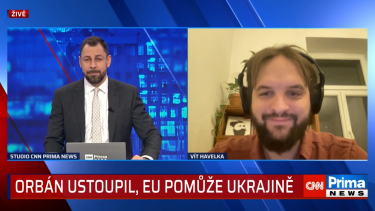Think Visegrad Fellowship offer: Call for proposals 2024
The Think Visegrad platform, which brings together think tanks from the Visegrad countries, including the EUROPEUM Institute for European Policy, is offering eight visiting fellowships to non-Visegrad expert fellows for the period Summer/Autumn/Winter of 2024. The duration of fellowships varies from 6 to 8 weeks (based on agreement with the hosting institute).
Show moreRadio Impuls | European Parliament's Inefficient Moving Between Two Locations
European Parliament's moving from Brussels to plenary sessions in Strasbourg carry symbolic significance, but the logistics costs up to 3 billion CZK annually. Implementing a change would require amending the fundamental treaties of the European Union, which would need approval from all member states. Viktor Daněk, Deputy Director of the EUROPEUM Institute, commented on this topic for Radio Impuls.
Show moreTN.cz | Politicians can't talk about migration because they would lose points with voters just before the European elections
The migration pact that European Parliament passed on Wednesday continues to stir emotions. Vít Havelka, senior research fellow at the EUROPEUM Institute, spoke to TN.cz about how migration is perceived in society and how politicians communicate it to the public.
Show more
Think Visegrad conference - EU Enlargement Forum
On 10 and 11 April 2024, Prague will host a two-day conference entitled "20 Years of Reuniting Europe's East and West", organised by EUROPEUM Institute for European Policy in cooperation with the Ministry of Foreign Affairs as part of the Think Visegrad platform and the project (Re)uniting the East and West: Reflections on the 2004 EU enlargement (REWEU) supported by the International Visegrad Fund and the European Commission. The programme will also include the second edition of the EU Enlargement Forum.
Show more
TN.cz | EUCO summit: European Union agrees to help Ukraine
Another summit of the EU leaders' in Brussels has ended. What topics were discussed? Deputy director and head of the Brussels office of the EUROPEUM Institute Žiga Faktor described the conclusions for TN Live.
Show more
TN.cz | Visegrad Group could unite over migration issue
The prime ministers of the Czech Republic, Slovakia, Poland and Hungary met in Prague to discuss the war in Ukraine and the future direction of the Visegrad Group. According to Viktor Daňek, deputy director of the EUROPEUM Institute, migration will be another possible common topic and Donald Tusk will become one of the most important politicians in Europe in the next years.
Show moreCNN Prima News | Orban backs down, EU to help Ukraine
To the surprise of many experts, Orbán decided not to prolong and complicate the negotiations at the EU summit, which in record time reached a unanimous decision on another aid package for Ukraine. Our senior research fellow Vít Havelka spoke about the situation on air.
Show more
TV Nova | How to make EU elections more attractive in the Czech Republic
Since 2004, Czechs have been able to vote in European Parliament elections. However, interest is low compared to other countries. Why is this the case and how could voter turnout be increased? Martin Vokálek, Executive Director of EUROPEUM, discussed this topic.
Show more
Commentary | how to think about unanimity in the EU
With the opening of accession talks with Ukraine and Moldova, the debate in the European Union on the transition from unanimity to qualified majority voting in some areas has been reignited. Although this is not a new debate, it is worth looking at the current situation, describing the problems caused by unanimity and proposing concrete solutions. For more, see Vit Havelka's commentary.
Show moreČRo Plus | What will the new EU migration rules commit the Czech Republic to?
After many years of unsuccessful efforts, EU member states and MEPs agreed today on new migration and asylum rules for the European bloc. The series of standards provides for, among other things, more effective checks on migrants and faster return of failed asylum seekers to their countries of origin. It also introduces compulsory solidarity among all EU states, which can help overburdened countries either by accepting part of the migrants or by providing financial or material aid. Our deputy director Viktor Daněk commented on the topic for Radiožurnál.
Show moreStaroměstské náměstí 4/1
Prague 1 - Staré Město
110 00
tel.: +420 212 246 552
email: europeum@europeum.org
https://www.europeum.org









